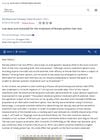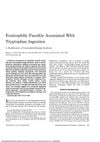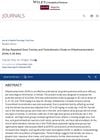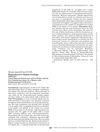August 2021 in “Journal of the American Academy of Dermatology” Oral baricitinib is effective and safe for treating alopecia areata.
 November 2024 in “Journal of Drugs in Dermatology”
November 2024 in “Journal of Drugs in Dermatology” Injectable minoxidil is a promising, effective treatment for hair loss.

COVID-19 can cause skin problems and affect dermatology treatments, with recommendations for skin care and cautious use of certain drugs.
 1 citations,
November 2011 in “Open access journal of contraception”
1 citations,
November 2011 in “Open access journal of contraception” Birth control pills with low-dose estrogen and antiandrogenic progestins can effectively treat acne.
 81 citations,
May 2007 in “Fertility and Sterility”
81 citations,
May 2007 in “Fertility and Sterility” Testosterone therapy seems safe for postmenopausal women for a few years, but more research is needed for long-term effects.
 12 citations,
June 2023 in “Journal of trace elements in medicine and biology”
12 citations,
June 2023 in “Journal of trace elements in medicine and biology” Eating too much selenium can cause bad breath, hair loss, and nail changes, with harmful effects starting at low daily doses.
 June 1995 in “International Journal of Gynecology & Obstetrics”
June 1995 in “International Journal of Gynecology & Obstetrics” Higher doses of oestradiol implants improve bone density in postmenopausal women.

Choose oral contraceptives with specific side effects to manage issues like acne and avoid unwanted effects.
 August 2024 in “Skin Research and Technology”
August 2024 in “Skin Research and Technology” Low-dose oral minoxidil can help increase hair growth in women with hair loss.
 5 citations,
March 2012 in “Clinical and Experimental Dermatology”
5 citations,
March 2012 in “Clinical and Experimental Dermatology” A woman experienced temporary hair loss after taking albendazole, which resolved on its own within 3 months.
 36 citations,
November 1995 in “Clinical endocrinology”
36 citations,
November 1995 in “Clinical endocrinology” Low-dose flutamide helps reduce excessive hair growth and is even more effective with birth control, without bad effects on blood fats.

Oral Minoxidil could be a safe and effective alternative treatment for various non-androgenic alopecias.
 20 citations,
February 1991 in “Archives of dermatology”
20 citations,
February 1991 in “Archives of dermatology” High doses of tryptophan may cause eosinophilic fasciitis.
 13 citations,
July 2019 in “Toxicology research”
13 citations,
July 2019 in “Toxicology research” Ethanamizuril is safe for rats at 20 mg/kg feed, but higher doses cause hair loss, organ changes, and liver, kidney, and lung damage.
37 citations,
May 2018 in “Transgender health” Oral estradiol works for many transgender women but needs personalized dosing and monitoring.
12 citations,
January 2011 in “Journal of the Saudi Society of Dermatology & Dermatologic Surgery” Thallium poisoning from contaminated cake caused severe health issues in Baghdad, highlighting the need to ban thallium as a rodenticide.
4 citations,
January 2018 in “Indian dermatology online journal” Trichoscopy helped diagnose and cure a child's hair loss caused by a fungal infection.
 37 citations,
May 2016 in “JAAD case reports”
37 citations,
May 2016 in “JAAD case reports” Oral minoxidil shows promise in treating monilethrix-related hair loss.
18 citations,
July 1998 in “Pediatric Dermatology” Monthly oral corticosteroid pulses effectively treat widespread alopecia areata in young patients.
1 citations,
July 2022 in “JEADV Clinical Practice” New and existing treatments for hair loss show promise, with some being more effective for men and others for women.
 December 2024 in “Journal of Applied Toxicology”
December 2024 in “Journal of Applied Toxicology” High doses of dihydroartemisinin caused reversible liver toxicity in rats, with females more affected than males.
 November 2022 in “Journal of the Endocrine Society”
November 2022 in “Journal of the Endocrine Society” Taking biotin can lead to incorrect low results in free testosterone tests.
54 citations,
July 1994 in “Journal of Dermatological Science” FK506 may stimulate hair growth when applied to the skin.
 8 citations,
October 2019 in “Dermatologic Therapy”
8 citations,
October 2019 in “Dermatologic Therapy” Bicalutamide improves hair density in women safely.
February 2023 in “Seven Editora eBooks” Oral minoxidil has more side effects but can be more effective than topical minoxidil.
 52 citations,
June 1981 in “International Journal of Dermatology”
52 citations,
June 1981 in “International Journal of Dermatology” Oral retinoids are effective for severe skin conditions but require careful use due to side effects.
 108 citations,
November 1980 in “British Journal of Dermatology”
108 citations,
November 1980 in “British Journal of Dermatology” Oral retinoids are effective for various skin conditions but have side effects and should not be used during pregnancy.
48 citations,
July 1998 in “Pediatric Dermatology” Monthly oral corticosteroid pulses effectively treat widespread alopecia areata in young patients.
90 citations,
April 2013 in “Dermatology online journal” Different treatments for Hidradenitis suppurativa range from antibiotics and hormonal therapies to surgery, depending on severity.
 January 1987 in “Journal of steroid biochemistry/Journal of Steroid Biochemistry”
January 1987 in “Journal of steroid biochemistry/Journal of Steroid Biochemistry” Norethisterone (jenapharm) therapy is effective for endometrial cancer.



















